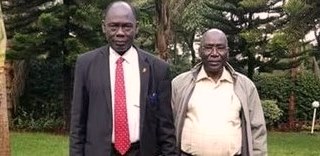A senior rebel official on Sunday said the region-backed peace process in South Sudan will not yield fruits unless leaders including President Kiir stop viewing the former army chief Paul Malong as peace spoiler.
The United States, Britain and Norway on Friday called for a peace process inclusive of ordinary men and women, civil society, religious leaders, ethnic minorities, and other excluded groups.
After years of fighting and failed deals, President Salva Kiir and opposition groups including his archrival Riek Machar signed a peace deal in the Sudanese capital Khartoum last week.
South Sudan United Movement/Army (SSUF/A) official Lewis Anei Madut Kuendit told Radio Tamazuj that it will be difficult for the region to succeed in its search for lasting peace in South Sudan without involving all estranged leaders, including General Paul Malong.
In April this year, South Sudan government said General Paul Malong should be excluded from joining the peace process in Addis Ababa, accusing him of being a believer in violence rather than peaceful means.
Anei, a former governor of Warrap state, urged the region to help get their armed movement included in the ongoing peace process in Khartoum for the sake of stability in the war-torn country, accusing the South Sudanese leader Salva Kiir Mayardit of excluding them from joining peace.
"The region and the members of the Troika need to work to ensure that there is inclusivity in the South Sudan peace talks. Does Salva Kiir really need peace if he is insisting on rejecting Malong’s movement to be part of peace?” he asked.
The rebel official also warned that unless the international community involves all opposition leaders including the former army chief Paul Malong in the peace process, they will keep up the fight against Kiir's government.
“It will be a big problem if SSUF is not included in the talks because it is an armed movement. We believe in peaceful solutions to any problem, so if people want South Sudan to witness peace and stability, there should be an inclusive process,” Anei said.
He also accused some regional leaders of trying to exclude Paul Malong intentionally because of international sanctions imposed on him during his time in office, arguing that his leader had no any formal command authority over the private militia known as 'Mathiang Anyoor' formed at the start of the crisis before being dispersed or absorbed into formal service branches.
“The private militia known as Mathiang Anyoor was formed by President Kiir himself,” he said.
Anei again accused neighbouring countries of allegedly helping prolong the civil war in South Sudan, without elaborating. He further said the signed peace agreement will not hold if all opposition groups don’t endorse it. “I want to call upon the region to include Malong in the peace process,” he said.
He underscored that their armed movement will not hold separate peace talks with President Salva Kiir. “Kiir and Malong should be part of the holistic solution to the South Sudanese crisis everywhere under the auspices of IGAD,” he said.
Federal system in South Sudan
Lewis also said their rebel movement supports Thomas Cirillo’s demand for federalism in South Sudan, a system of government in which state or regional governments hold their own exclusive powers, which the national government cannot interfere with.
“We are tired of tribalism. Let's address it through federalism so that people go back to their areas and then meet at the national level,” he said.
“We have it in our program and we are calling for full federal system because it is a popular demand. If federalism is applied now, it will reduce the problems,” he added.
General Paul Malong, who was widely regarded as a close ally of President Kiir, formed his armed movement in April year which he claimed was the only means through which he would work to arrest what he termed “carnage” in South Sudan.




